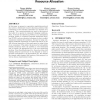1051 search results - page 67 / 211 » Foundations of Constraint Satisfaction |
CP
2004
Springer
14 years 3 months ago
2004
Springer
Constraint programming is rapidly becoming the technology of choice for modeling and solving complex combinatorial problems. However, users of constraint programming technology nee...
ATAL
2003
Springer
14 years 3 months ago
2003
Springer
In this paper we present a cooperative negotiation protocol that solves a distributed resource allocation problem while conforming to soft real-time constraints in a dynamic envir...
IAT
2003
IEEE
14 years 3 months ago
2003
IEEE
With the increasing use of the internet, many problemsolving tasks such as resource allocation, scheduling, planning, and configuration pose themselves in an open setting involvi...
CP
2003
Springer
14 years 3 months ago
2003
Springer
A reason to distribute constraint satisfaction is privacy: agents may not want to share their values, and they may wish to keep constraints as private as possible. In this paper, w...
SBACPAD
2003
IEEE
14 years 3 months ago
2003
IEEE
— Scheduling by Edge Reversal (SER) is a fully distributed scheduling mechanism based on the manipulation of acyclic orientations of a graph. This work uses SER to perform constr...

